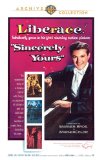| Reviews & Columns |
|
Reviews DVD TV on DVD Blu-ray 4K UHD International DVDs In Theaters Reviews by Studio Video Games Features Collector Series DVDs Easter Egg Database Interviews DVD Talk Radio Feature Articles Columns Anime Talk DVD Savant Horror DVDs The M.O.D. Squad Art House HD Talk Silent DVD
|
DVD Talk Forum |
|
|
| Resources |
|
DVD Price Search Customer Service #'s RCE Info Links |
|
Columns
|
|
|
Sincerely Yours (Warner Archive Collection)
Excrement to be sure...but so awful it's watchable. Just. Warner Bros.' Archive Collection of hard-to-find cult and library titles has released--right in time for all that post-Behind the Candelabra buzz--Liberace's one and only starring effort, Sincerely Yours, the 1955 remake of a remake of a remake of The Man Who Played God, co-starring Dorothy Malone, Joanne Dru. Alex Nicol, Lurene Tuttle, Loris Nelson, Richard Eyer, James Bell, and William Demarest. An ill-conceived, expensive vanity project Warners hoped would pay off big-time at the box office, this notorious stinker was the first hint that Liberace's rather staggering stardom in the mid-50s had perhaps finally peaked, with the bejeweled one never again headlining his own big-screen outing. Seen today, small parts of Sincerely Yours are the perfect embodiment of his act's delightful, ridiculous excesses: schmaltz and sentiment, blown up to gaudy, gargantuan proportions. And thank god for that, because on the whole...it's wretched. No extras, unfortunately, for this rough-looking widescreen transfer.
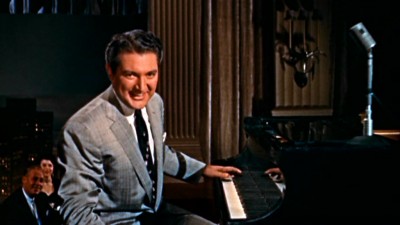
Popular pianist Anthony Warrin (Liberace) doesn't have enough hours in the day to satisfy all the cross-country requests he receives for personal appearances. An entertainer who slays the masses by bringing them to classical music via medleys of plebian pop works such as The Beer Barrel Polka and Tea for Two, Warrin craves the last illusive rung on the ladder of success for a musician: a concert at Carnegie Hall, intended to wow the "serious" critics who remain immune to his saturnine, puffy-faced charms. Certainly not immune to this almost portly populist Pied Piper, Marion Moore (Joanne Dru), Anthony's all-business secretary, is finding it increasingly difficult to hide her true feelings for her ivory-tinkling boss, a fact not lost on gruff manager Sam Dunne (William Demarest). However, a chance meeting with bored, dilettante socialite Linda Curtis (Dorothy Malone) completely turns his head, with the composer proposing marriage within a whirlwind 24-hour romance. When the Carnegie Hall gig finally comes through, Anthony's journey seems complete...however, right before the curtain rises, Anthony's world comes crashing down: he becomes stone deaf. Robbed of his career playing the piano, a reclusive, lip-reading Anthony vicariously spies on Central Park occupants in the hopes of helping them, including a little handicapped boy, Alvie (Richard Eyer), who wants to play football, and kindly hick Mrs. McGinley (Lurene Tuttle), whose newly-married daughter, Sarah (Lori Nelson), is ashamed of her humble beginnings. But what will Anthony do when he spies on Linda, and lip-reads her exclamation of love for composer Howard Ferguson (Alex Nicol)?
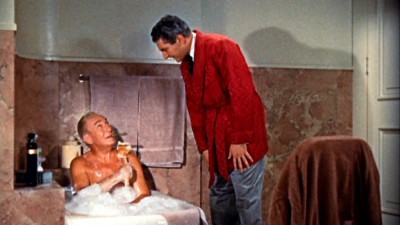
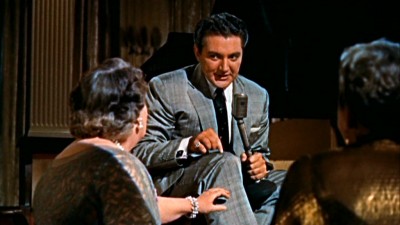
Years ago, I wrote several times about some Liberace-related discs, and I never made any bones about being an unabashed fan of his stage persona and act. As I wrote before, I can distinctly remember catching a Liberace special shot for Showtime back in the late 70s, and coming away thinking he was one hell of a performer. I know serious musicians and critics looked down on his schmaltzy arrangements of classical pieces and his ridiculously exaggerated style of playing (the better for audiences to see his bejeweled hands in action), while pop culture pundits snickered at his gaudy, overblown sets and costumes, as well as at his cadre of blue-haired dears who sat reverently at ringside, following his every move (you can read a lot of supercilious cultural snobbery going on with those taunts; after all, Victor Borge messed around with the classics, too, but the intelligentsia loved him). But I have to say that, even as a kid, I found him to be delightfully funny whenever he showed up on Carson or some other talk show. You can say what you want about his rather bizarre manufactured image, but there was no denying that his rapport with his audience was special, and that his comedic timing was flawless. And most importantly, his playing was wonderful. I confess I'm no authority on music; I know I couldn't truly tell the difference between a piano virtuoso and a merely accomplished performer (and I suspect neither could 99 percent of the rest the population, either). So when I read critics who say he "murdered" classical pieces with his abbreviated arrangements, and that his technique was "atrocious," well...who cares if that's even true? What he does sounds beautiful to me. Add to that his polished showmanship, and that's all I need to be entertained.
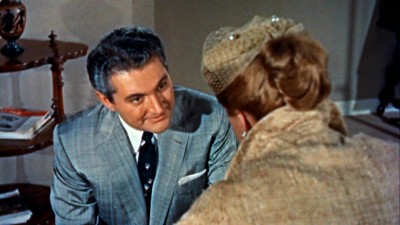
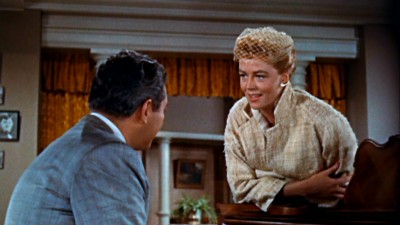
So...what then is one to make of Sincerely Yours? The movie's horrific reputation is legendary (the Medved brothers devoted a whole chapter to it in one of the bad movie books), with disapproving reviewers lambasting, with equal measure, Liberace's debut as a leading man and this melodramatic showcase. From a gambling aspect, you can't fault Warner Bros. for making the business decision to hire Liberace in the hopes of cashing in on his huge fan base (at the time of the movie's production, Liberace, arguably, was the highest paid performer in the world, with an audience for his syndicated television show estimated at over 25 million, and over 200 registered fan clubs across the country). Was it wise, however, to pick this particular creaky old vehicle, which was based on Jules Eckert Goodman's ancient play The Silent Voice, which had been filmed three times already (twice as a silent, which should have been a red flag to someone), and then to spend so much money on filming it yet again (including an unreported sky-high salary for the star as part of a two-picture deal)? Probably not. You can't blame Warners for looking for a schmaltzy pre-sold project that revolved around piano-playing in the hopes of shoe horning-in Liberace, but you can blame them for going the heavy drama route instead of picking something light and effervescent (why the hell didn't they go for the obvious for him--a musical comedy?).
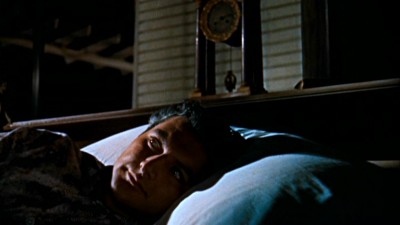
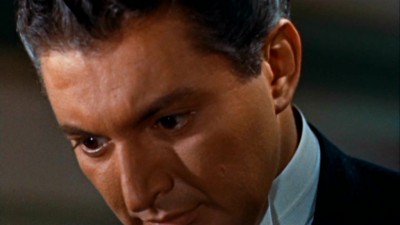
Unlike a musical comedy, where a plot (and the need to create a bona fide "character") would have been superfluous, Sincerely Yours, locked into a "heavy drama" structure that needed unnecessarily clunky, gloppy thematic validation, wastes an inordinate amount of time on trying to prove something that Liberace's rabid audience already fully knew--that he was a populist entertainer who delivered "classical music with the boring parts left out"--while it presented a new, more serious Liberace that his audience didn't really want. It's as if the moviemakers didn't read their own script. The character of Anthony Warrin is constantly applauded for not taking his beloved classics too seriously...and yet he's portrayed here by a whimsical, light, charming performer who's been bizarrely instructed to jettison his already successful sunny persona to play someone who suffers almost constantly, even to the point of suicide. No wonder most of Liberace's fans politely side-stepped Sincerely Yours.
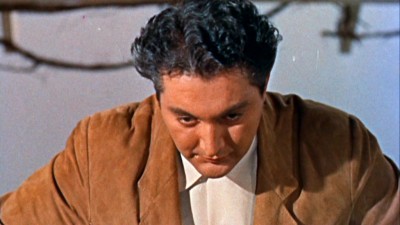
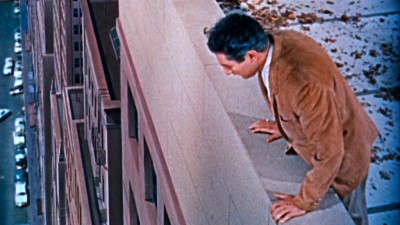
Not exactly helping matters is the ridiculously contrived aspects of screenwriter Irving Wallace's (yep...that Irving Wallace) story. If you've read any of my other reviews, then you'll know that I love unabashed melodrama; as long as it's done with conviction and its own internal logic, then...the more outrageous the better. However, too many of Sincerely Yours's "big" moments are so awkwardly introduced and executed that one almost immediately winds up taking pleasure in their overripe grotesqueness, rather than enjoying them for what should have been their entertaining over-expressiveness. I suppose one could have a field day picking out a post-modern gay subtext from Sincerely Yours, if you're in the mood for those kind of parlor games. However, there are more than enough concrete, in-your-face problems with the movie to satisfy anyone looking to write a term paper. I don't mind the obvious sops to Liberace's fan base, including Liberace's soured persimmon disapproval of poor little commoner Lurene Tuttle's treatment at the hands of her snooty daughter, or the subsequent Queen for a Day (sorry...couldn't resist) fantasy sequence for all his fans when he takes skint Tuttle out shopping, making her over into a post-menopausal Cinderella (true to Sincerely Yours's phoniness, all those jaded New Yawk swells just melt when they see what a game gal 'ol Tuttle is at the charity event). All those old dears must have flipped their girdles when they imagined themselves out on a spree with curiously asexual, completely non-threatening dreamboat Lee Liberace. Anytime Liberace acts like the Liberace we already know--the numerous musical interludes here, and a marvelous nightclub scene were we see the "real" Liberace's bouncy charm and expert comedic timing--then Sincerely Yours is at least tolerable as "showcase," but not really as "movie."
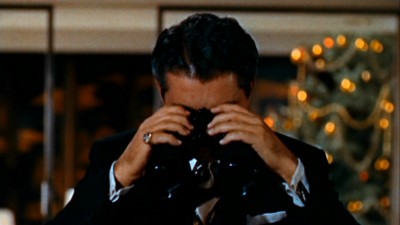
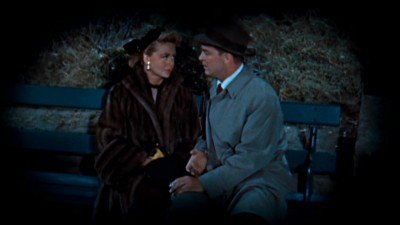
However, what am I to do with Liberace's completely unconvincing pursuit of Dorothy Malone here--perhaps the single most perverse pairing of totally unsuited opposites in movie history (too-talented Malone, even in garbage like this and buttoned up to Puritanical regulation, simply can not help but exude that corrosive eroticism that made her justifiably one of the hottest pieces of ass to ever grace the big screen)? Why did Warners attempt the Herculean task to remake Wladziu Valentino Liberace into a hubba-hubba ladies man when it was clearly a losing proposition (watch for all the forced monikers that I.D. him as a "regular" Joe here, including his desire to gamble on the fights)? Why did they keep that frankly creepy second half where the character turns into a binocular-wearing Peeping Tom, selflessly trying to help others whose problems are even more mundane than his own? And why in god's name did they have him almost commit suicide--something those 1950s audiences would NEVER forgive in a romantic male lead? If one didn't know what a total pro helmer Gordon Douglas was (one of my fav studio hacks of Our Gang fame, with such diverse, entertaining titles as I Was a Communist for the FBI, Them!, The Fiend Who Walked the West, Follow That Dream, Tony Rome, In Like Flint, and The Detective on his long, long resume), you might be tempted to think Douglas was deliberately sabotaging Liberace's big debut. How else can one take what should have been Liberace's "big, big" scene--the post-operation sequence where his hearing is restored--where Liberace is filmed in grotesque close-up, looking like "Grandpa" Al Lewis after three Cortisone shots and a permanent wave gone wrong, burbling "Thank God!" as tears stream down his face? Everyone at the studio thought scenes like that were going to cross Liberace over into movie stardom? Watching Sincerely Yours today, we can enjoy many such moments in Sincerely Yours...but for all the wrong reasons.
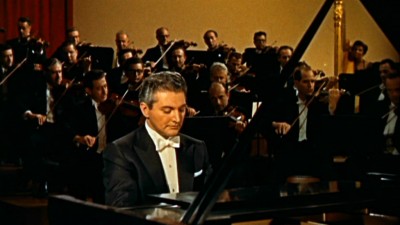
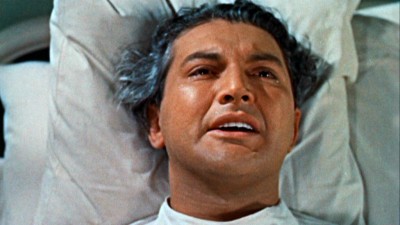
The DVD:
The Video:
The anamorphically-enhanced 1.85:1 widescreen transfer looks a little tight in spots (Warners didn't have a strict soft matte ratio policy during the first years of widescreen exhibition), but more problematic is the rough, grainy image here: soft, blurry in spots, with frequently washed-out color. Not the best.
The Audio:
The Dolby Digital English split mono audio track is acceptable, with low hiss and an okay re-recording level. No subtitles or closed-captions available.
The Extras:
No extras for Sincerely Yours.
Final Thoughts:
The beginning and the end of Liberace's leading man days. Sure there have been other huge TV stars that flamed out (hee hee!) when they hit the big screens--Ricky and Lucy together were a bust at theatres, Jackie Gleason never carried his own big hit movie, and mercifully, Roseanne Barr wasn't permitted to graze across the wide screen more than once or twice--but none of them endured the level of critical humiliation that Liberace suffered when Sincerely Yours snuffed it at the box office. Watching it today, you can focus just on the musical interludes as a record of Mr. Showbusiness in his prime, and that's probably enough to recommend the movie. However, lovers of truly wrong cinema will want to add Sincerely Yours to their "must have" lists pronto. Against everything that is good and decent in this world, I'm recommending Sincerely Yours...for all the wrong reasons.
Paul Mavis is an internationally published movie and television historian, a member of the Online Film Critics Society, and the author of The Espionage Filmography.


|
| Popular Reviews |
| Sponsored Links |
|
|
| Sponsored Links |
|
|
| Release List | Reviews | Shop | Newsletter | Forum | DVD Giveaways | Blu-Ray | Advertise |
|
Copyright 2024 DVDTalk.com All Rights Reserved. Legal Info, Privacy Policy, Terms of Use,
Manage Preferences,
Your Privacy Choices | |||||||









